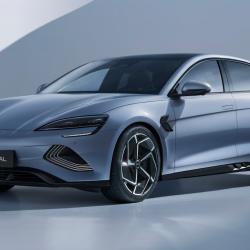Luxury Carmakers Face Headwinds In China: The BMW And Porsche Case Study

Table of Contents
Shifting Consumer Preferences in the Chinese Luxury Car Market
The Chinese luxury car buyer is no longer the same. A generational shift is underway, impacting purchasing decisions significantly. The rise of younger, tech-savvy consumers, coupled with a growing awareness of environmental concerns, is reshaping the market.
- Rise of younger, tech-savvy consumers: Millennials and Gen Z are increasingly influential in luxury purchases, demanding advanced technology, seamless digital experiences, and personalized services. This translates into a greater emphasis on in-car technology, connectivity features, and personalized customization options.
- Growing preference for electric and hybrid vehicles: Environmental consciousness and government incentives are driving demand for electric vehicles (EVs) and hybrids. Luxury brands must invest heavily in electric vehicle technology to remain competitive.
- Increased demand for personalized and customized experiences: Chinese luxury buyers increasingly seek unique and bespoke experiences, pushing carmakers to offer more tailored options and services, ranging from exclusive design packages to personalized concierge services.
- Focus on brand storytelling and social responsibility: Consumers are more discerning, favoring brands that align with their values. Authentic brand storytelling and a demonstrable commitment to social responsibility are becoming critical for success.
- Impact of social media and influencer marketing: Social media plays a crucial role in shaping consumer perceptions and driving purchasing decisions. Effective digital marketing strategies and influencer collaborations are essential for reaching the target audience.
The Impact of Economic Slowdown and Geopolitical Factors on Luxury Car Sales in China
The Chinese luxury car market is not immune to macroeconomic fluctuations and geopolitical events. Economic slowdowns, trade tensions, and supply chain disruptions can significantly impact sales.
- Impact of trade tensions and tariffs: Trade disputes and tariffs can increase the cost of imported vehicles, impacting pricing and competitiveness.
- Effect of economic slowdown on consumer spending: Economic uncertainty can lead to reduced consumer spending, particularly in discretionary categories like luxury cars.
- Supply chain disruptions and their consequences: Global supply chain disruptions can lead to delays in vehicle deliveries and impact production schedules.
- Fluctuations in the Chinese Yuan and its impact on pricing: Changes in the exchange rate between the Chinese Yuan and other currencies can influence pricing strategies and profitability.
BMW's Response to the Challenges: A Case Study
BMW, a long-standing player in the Chinese luxury car market, is actively adapting to the changing landscape.
- BMW's electric vehicle strategy in China: BMW is investing heavily in electric vehicle development and production in China, offering a range of electric and hybrid models to cater to growing demand.
- Marketing campaigns targeting specific demographics: BMW tailors its marketing campaigns to resonate with specific demographics, leveraging digital channels and social media effectively.
- Investments in local production and partnerships: BMW has invested significantly in local production facilities and partnerships to enhance efficiency and reduce costs.
- Adaptation of services and features for the Chinese market: BMW customizes its offerings to meet the specific needs and preferences of Chinese consumers, incorporating features and services highly valued in the local market.
Porsche's Approach: Navigating the Competition and Maintaining Brand Prestige
Porsche, renowned for its high-performance vehicles and brand prestige, maintains its position by focusing on exclusivity and customer experience.
- Porsche's focus on high-performance vehicles and exclusivity: Porsche continues to emphasize its heritage of high-performance vehicles, maintaining a strong brand identity and exclusivity.
- Digital marketing strategies and brand engagement: Porsche employs sophisticated digital marketing strategies to engage with consumers and build brand loyalty.
- Emphasis on customer experience and personalization: Porsche prioritizes delivering exceptional customer experiences, providing personalized services and building strong relationships with its clientele.
- Strategies for competing with both established and emerging brands: Porsche adopts strategies to compete effectively against both established luxury brands and emerging domestic competitors.
Future Outlook: Predictions and Opportunities for Luxury Carmakers in China
The future of the China luxury car market holds both challenges and opportunities.
- Growth potential in specific segments (e.g., electric vehicles, SUVs): Strong growth is anticipated in specific segments, such as electric vehicles and SUVs, representing significant opportunities for luxury carmakers.
- Importance of adapting to changing consumer behavior: Adapting to evolving consumer preferences and expectations will be crucial for success.
- Opportunities for collaborations and partnerships: Collaborations and strategic partnerships can unlock new avenues for growth and innovation.
- Long-term strategies for sustainable growth in the Chinese market: A long-term strategic vision focusing on sustainability, innovation, and customer centricity is essential for sustained success in the Chinese luxury car market.
Navigating the Headwinds: The Future of Luxury Carmakers in China
Luxury carmakers like BMW and Porsche face significant challenges in China's evolving market. Successfully navigating these headwinds requires adapting to shifting consumer preferences, addressing economic uncertainties, and responding effectively to increased competition. Understanding the nuances of the China luxury car market, including evolving consumer tastes and economic factors, is paramount for long-term success. Learn more about navigating the complexities of the China luxury car market and explore further case studies of luxury carmakers facing headwinds in China to gain a deeper understanding of this dynamic sector.

Featured Posts
-
 Jennifer Lawrence And Husband Cooke Maroney A Rare Public Appearance
May 19, 2025
Jennifer Lawrence And Husband Cooke Maroney A Rare Public Appearance
May 19, 2025 -
 Apagon Del Sitio Web Del Cne Seis Enlaces Revelan La Intencion Deliberada
May 19, 2025
Apagon Del Sitio Web Del Cne Seis Enlaces Revelan La Intencion Deliberada
May 19, 2025 -
 Orlando Blooms Fitness Friday The Cold Plunge Challenge
May 19, 2025
Orlando Blooms Fitness Friday The Cold Plunge Challenge
May 19, 2025 -
 Ierosolymon T Heofilos Imera Onomastikis Eortis Kai Symvolismos
May 19, 2025
Ierosolymon T Heofilos Imera Onomastikis Eortis Kai Symvolismos
May 19, 2025 -
 Le Salami Au Chocolat Une Recette Francaise Facile A Faire
May 19, 2025
Le Salami Au Chocolat Une Recette Francaise Facile A Faire
May 19, 2025
